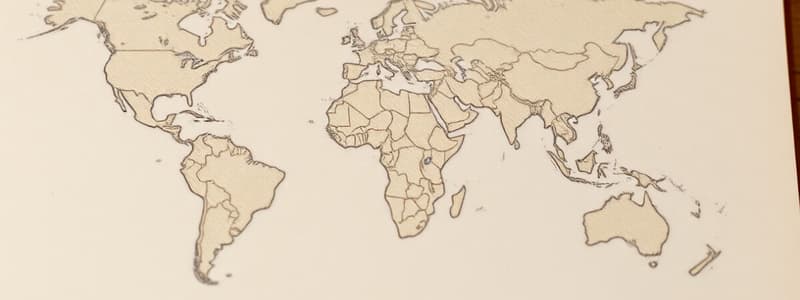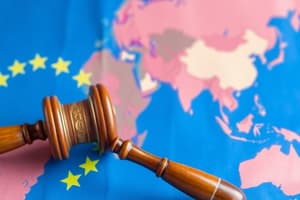Podcast
Questions and Answers
What is the main focus of the Nationality Principle in international jurisdiction?
What is the main focus of the Nationality Principle in international jurisdiction?
- Protecting foreign nationals from harm abroad
- Allowing a state to exercise jurisdiction over its nationals even outside its territory (correct)
- Establishing jurisdiction for crimes against a state's own nationals
- Granting states authority over crimes committed solely within their borders
Which scenario exemplifies the Passive Personality Principle in international law?
Which scenario exemplifies the Passive Personality Principle in international law?
- A non-national commits fraud against a country's financial system
- A state prosecutes its citizens for crimes committed within its own borders
- A US national is harmed by a foreign attacker while abroad (correct)
- A foreign national is prosecuted for tax evasion committed in their home country
What demonstrates the Protective Principle's focus on a state's own interests?
What demonstrates the Protective Principle's focus on a state's own interests?
- Jurisdiction over a foreign national for harming a US citizen abroad
- Establishing laws against non-nationals for domestic disturbances
- Exerting control over citizens for crimes committed overseas
- Prosecuting a person for actions that threaten the state's security or political independence (correct)
Which of the following is a potential limitation of the Passive Personality Principle?
Which of the following is a potential limitation of the Passive Personality Principle?
In which case has the US asserted jurisdiction over acts committed abroad that pose a crime against US interests?
In which case has the US asserted jurisdiction over acts committed abroad that pose a crime against US interests?
What can individuals do when they are harmed by acts of another state that violates international law?
What can individuals do when they are harmed by acts of another state that violates international law?
Which of the following statements regarding individuals and international law is true?
Which of the following statements regarding individuals and international law is true?
What triggers individual responsibility under international law?
What triggers individual responsibility under international law?
What is guaranteed to everyone in terms of nationality?
What is guaranteed to everyone in terms of nationality?
What is a right that states have in relation to their nationals abroad?
What is a right that states have in relation to their nationals abroad?
How can individuals be prosecuted for international law violations?
How can individuals be prosecuted for international law violations?
What role does an individual's nationality play in international law?
What role does an individual's nationality play in international law?
What can states do in relation to aliens outside their territory?
What can states do in relation to aliens outside their territory?
What is meant by jurisdiction to prescribe?
What is meant by jurisdiction to prescribe?
Which aspect does the jurisdiction to adjudicate primarily focus on?
Which aspect does the jurisdiction to adjudicate primarily focus on?
What role does jurisdiction to enforce play in legal systems?
What role does jurisdiction to enforce play in legal systems?
Under the Territorial Principle, where does a state have jurisdiction?
Under the Territorial Principle, where does a state have jurisdiction?
What does the Restatement define as the jurisdiction to adjudicate?
What does the Restatement define as the jurisdiction to adjudicate?
What characterizes the subjective aspect of the territorial principle?
What characterizes the subjective aspect of the territorial principle?
Which of the following describes the relationship needed for reasonable jurisdiction to adjudicate?
Which of the following describes the relationship needed for reasonable jurisdiction to adjudicate?
Which statement best represents the objective aspect of jurisdiction under the Territorial Principle?
Which statement best represents the objective aspect of jurisdiction under the Territorial Principle?
What does the clean hands doctrine imply in the context of reciprocal obligations between parties?
What does the clean hands doctrine imply in the context of reciprocal obligations between parties?
What principle does the Corfu Channel case emphasize regarding international obligations?
What principle does the Corfu Channel case emphasize regarding international obligations?
In environmental law, what does the principle of proportionality dictate?
In environmental law, what does the principle of proportionality dictate?
What was the main outcome of the Prosecutor v. Erdemovic case regarding duress as a defense?
What was the main outcome of the Prosecutor v. Erdemovic case regarding duress as a defense?
In the context of Iran v. US, what was the International Court of Justice's ruling based on the principle of proportionality?
In the context of Iran v. US, what was the International Court of Justice's ruling based on the principle of proportionality?
What distinguishes general principles of law from specific rules?
What distinguishes general principles of law from specific rules?
Which concept is most closely associated with the equitable remedy known as 'clean hands'?
Which concept is most closely associated with the equitable remedy known as 'clean hands'?
What is the implication of the equidistant method in international law according to the North Sea Continental Shelf case?
What is the implication of the equidistant method in international law according to the North Sea Continental Shelf case?
What is the primary function of the Foreign Sovereign Immunities Act (FSIA)?
What is the primary function of the Foreign Sovereign Immunities Act (FSIA)?
Which of the following is NOT an exception to the sovereign immunity of foreign states under FSIA?
Which of the following is NOT an exception to the sovereign immunity of foreign states under FSIA?
How can a foreign state implicitly waive its sovereign immunity according to FSIA?
How can a foreign state implicitly waive its sovereign immunity according to FSIA?
In which scenario would a foreign state NOT be immune from a lawsuit?
In which scenario would a foreign state NOT be immune from a lawsuit?
What characterizes an express waiver of sovereign immunity?
What characterizes an express waiver of sovereign immunity?
Which court case illustrates that a foreign state waives its immunity by seeking redress in the court of another country?
Which court case illustrates that a foreign state waives its immunity by seeking redress in the court of another country?
Under the FSIA, when does a foreign state retain its immunity?
Under the FSIA, when does a foreign state retain its immunity?
Which of the following activities can lead to jurisdiction over a foreign state under FSIA?
Which of the following activities can lead to jurisdiction over a foreign state under FSIA?
What does the principle of 'non-appropriation' in outer space regulations imply?
What does the principle of 'non-appropriation' in outer space regulations imply?
What is the main aim of Space Traffic Management (STM)?
What is the main aim of Space Traffic Management (STM)?
What does the concept of 'state responsibility' entail in terms of outer space activities?
What does the concept of 'state responsibility' entail in terms of outer space activities?
What does the term 'space situational awareness' (SSA) refer to?
What does the term 'space situational awareness' (SSA) refer to?
What is the primary focus of the Liability Convention in outer space law?
What is the primary focus of the Liability Convention in outer space law?
Which of the following describes the 'Rescue Agreement' in outer space?
Which of the following describes the 'Rescue Agreement' in outer space?
Under the Outer Space Treaty, how are astronauts viewed in terms of rights and responsibilities?
Under the Outer Space Treaty, how are astronauts viewed in terms of rights and responsibilities?
What does the term 'peaceful purposes' mean in the context of outer space activities?
What does the term 'peaceful purposes' mean in the context of outer space activities?
Which of the following is a key aspect of the registration process for space objects?
Which of the following is a key aspect of the registration process for space objects?
What does Article II of the Outer Space Treaty emphasize about outer space?
What does Article II of the Outer Space Treaty emphasize about outer space?
Flashcards
Lex posterior
Lex posterior
In environmental law, the later law in time takes precedence over an earlier one.
Clean hands doctrine
Clean hands doctrine
An equitable principle in law stating that a party seeking enforcement of a right must not have acted unfairly in the matter.
General principles of law
General principles of law
Principles of law that fill gaps in treaties and customs when applicable.
Corfu Channel case
Corfu Channel case
Signup and view all the flashcards
Proportionality (action)
Proportionality (action)
Signup and view all the flashcards
Iran v. US Case
Iran v. US Case
Signup and view all the flashcards
Proportionality (result)
Proportionality (result)
Signup and view all the flashcards
North Sea Continental Shelf case
North Sea Continental Shelf case
Signup and view all the flashcards
State protection of citizens
State protection of citizens
Signup and view all the flashcards
Individual rights in international law
Individual rights in international law
Signup and view all the flashcards
Individuals and international obligations
Individuals and international obligations
Signup and view all the flashcards
Individual legal action against states
Individual legal action against states
Signup and view all the flashcards
Individual international rights
Individual international rights
Signup and view all the flashcards
Individual Responsibility in crimes
Individual Responsibility in crimes
Signup and view all the flashcards
State's right to regulate nationals
State's right to regulate nationals
Signup and view all the flashcards
Nationality and international law
Nationality and international law
Signup and view all the flashcards
Nationality Principle
Nationality Principle
Signup and view all the flashcards
Protective Principle
Protective Principle
Signup and view all the flashcards
Passive Personality Principle
Passive Personality Principle
Signup and view all the flashcards
Jurisdiction over US citizens abroad
Jurisdiction over US citizens abroad
Signup and view all the flashcards
US jurisdiction over terrorism
US jurisdiction over terrorism
Signup and view all the flashcards
Jurisdiction to Prescribe
Jurisdiction to Prescribe
Signup and view all the flashcards
Legislative Jurisdiction
Legislative Jurisdiction
Signup and view all the flashcards
Jurisdiction to Adjudicate
Jurisdiction to Adjudicate
Signup and view all the flashcards
Minimal Contact
Minimal Contact
Signup and view all the flashcards
Jurisdiction to Enforce
Jurisdiction to Enforce
Signup and view all the flashcards
Territorial Principle
Territorial Principle
Signup and view all the flashcards
Subjective Territorial Jurisdiction
Subjective Territorial Jurisdiction
Signup and view all the flashcards
Objective Territorial Jurisdiction
Objective Territorial Jurisdiction
Signup and view all the flashcards
Foreign Sovereign Immunity
Foreign Sovereign Immunity
Signup and view all the flashcards
FSIA
FSIA
Signup and view all the flashcards
Waiver of Immunity
Waiver of Immunity
Signup and view all the flashcards
Commercial Activity Exception
Commercial Activity Exception
Signup and view all the flashcards
Direct Effect
Direct Effect
Signup and view all the flashcards
Argentina v. Amerada Hess
Argentina v. Amerada Hess
Signup and view all the flashcards
Siderman de Blake v. Argentina
Siderman de Blake v. Argentina
Signup and view all the flashcards
Apparent Authority
Apparent Authority
Signup and view all the flashcards
Outer Space Treaty
Outer Space Treaty
Signup and view all the flashcards
Non-appropriation
Non-appropriation
Signup and view all the flashcards
Peaceful Purposes
Peaceful Purposes
Signup and view all the flashcards
Freedom of Exploration & Use
Freedom of Exploration & Use
Signup and view all the flashcards
State Responsibility
State Responsibility
Signup and view all the flashcards
Space Traffic Management (STM)
Space Traffic Management (STM)
Signup and view all the flashcards
Space Situational Awareness (SSA)
Space Situational Awareness (SSA)
Signup and view all the flashcards
Status of Humans in Space
Status of Humans in Space
Signup and view all the flashcards
Space Resources
Space Resources
Signup and view all the flashcards
Launching State
Launching State
Signup and view all the flashcards
Study Notes
Sources of International Law
- Treaties are international agreements in written form, concluded between states, governed by international law. Participation in the UN automatically means that the treaty must be registered to be invoked before any UN body, including the ICJ.
- Customary international law emerges from consistent state practice, accompanied by a belief in its legality (opinio juris).
- General principles of law are fundamental legal concepts common to most legal systems. These principles inform and supplement international law when no treaty or customary law applies.
- Judicial decisions and the writings of highly qualified publicists are subsidiary sources of international law.
Treaty Reservations
- A reservation is a unilateral statement made when signing, ratifying, acceding to, or approving a treaty. It aims to exclude or modify certain treaty provisions' legal effect on the reserving state.
- Reservations are permissible unless expressly prohibited in the treaty, or if the reservation is incompatible with the treaty's object and purpose.
- Declarations clarify treaty interpretation without altering legal effect.
Customary International Law
- Customary international law consists of two elements: consistent state practice (objective) and the belief in the binding nature of the practice as law (opinio juris).
- Peremptory norms (jus cogens) are higher than customary law or treaties, and cannot be violated under any circumstances. Examples include prohibitions of genocide and aggression.
General Principles of Law
- General principles of law are widely recognized legal concepts that guide international law.
- They are common in various domestic legal systems but aren't derived from treaties or customary law.
- They are commonly used by international courts supplementing other sources of law.
Judicial Decisions and Scholarly Writings
- Judicial decisions of international courts (like the ICJ) are relevant but non-binding precedents.
- Writings of recognized scholars provide additional clarity on international legal principles. They are used to determine the appropriate interpretation or application of existing rules.
Statehood
- Criteria for statehood typically include a permanent population, a defined territory, a government, and the capacity to enter into relations with other states.
- The existence of a state is determined by factual criteria rather than recognition.
- The dominant view is that a state exists if it meets the criteria laid down in international law, regardless of whether states have given it recognition. This view is known as the declarative theory of statehood.
State Responsibility
- An internationally wrongful act by a state triggers state responsibility.
- Attributes conduct to the state.
- State conduct must breach a pre-existing international obligation stemming from treaties, customary law, or general principles of law.
International Organizations
- International organizations possess international legal personality, derived from their constituent instruments – allowing them to engage in international relations and have rights and responsibilities.
- Membership is established through treaty agreement with states acting through appropriate authorities and with the appropriate documentation.
Individuals
- While traditionally considered objects of international law, individuals are increasingly recognized as subjects of international law with rights and obligations (e.g. human rights treaties).
- Their rights can be advanced before international tribunals or special courts.
Non-Governmental Organizations (NGOs)
- Non-governmental organizations (NGOs) play an important role in international affairs, influencing state practice, contributing to lawmaking, and providing resources to international organizations and other entities, but they do not have international legal personality.
International Criminal Law
- International criminal law deals with individuals who commit severe international crimes.
- These can include war crimes, crimes against humanity, genocide, and aggression.
- States are responsible for investigating, prosecuting, or extraditing perpetrators of these crimes.
Law of Armed Conflict
- LOAC governs states, groups, individuals, and the protection of persons during conflict.
- LOAC aims to limit the effects of armed conflict by establishing rules for conduct.
- It dictates rules of engagement during armed conflict and the types of permissible weapons.
Law of the Sea
- The Law of the Sea (LOSC) establishes a framework for the rights and responsibilities of states with respect to the sea.
- Includes various zones (e.g., territorial sea, EEZ) with varying degrees of state sovereignty.
- Navigational rights, resource exploitation, and environmental protections are covered.
Law of the Global Commons
- The concept of global commons refers to resources not under one state's jurisdiction.
- Examples include Antarctica, outer space, and the high seas.
Transitional Justice
- Transitional justice mechanisms help societies come to terms with past violations.
- This includes mechanisms like truth commissions and reparations to help individuals who have been harmed by past violations and also helps societies as a whole resolve past conflicts and achieve a more stable society.
Studying That Suits You
Use AI to generate personalized quizzes and flashcards to suit your learning preferences.




